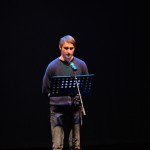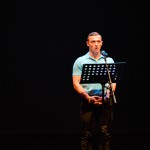UTM students looking for a way to share their voice now have one more avenue to get their work out there: a new student journal on campus, UTM Compass. Compiling research-based non-fiction work, UTM Compass celebrates writing in the fields of science, history, and finance.
The first print edition of Compass was launched in the MiST theatre last Tuesday. Contributors to the journal read excerpts from their pieces while the audience enjoyed refreshments and waited to buy a copy. The launch gave a sampling of the many topics Compass covers, including pieces on sea horse mating habits, hallucinatory drugs, and political unrest in Bangladesh.
Professor Guy Allen was also on hand at the launch, speaking briefly about the importance of having a platform for student voices and the unique nature of Compass. “It’s very unusual to have undergraduate students operating at this level,” he said in his opening remarks.
Compass’ founders are co-editors-in-chief Tiffany Limgenco and Alex Geddes. Commiserating in class one day about there being so few opportunities for research-based writing to get published at the undergraduate level, they decided to take matters into their own hands, and Compass was born. They gathered fellow editors Sonia Dhaliwal, Melissa Carter, Tyler McLaren, and Lauren Walsh and launched Compass as a trial online publication last summer.
“The greatest challenge for Compass was in finding a place within the university,” Geddes said. “We knew we would fall under the CCIT/PWC departments’ watch, but had little direction from there.” However, after garnering attention with the online edition of Compass, the team did indeed find a place. The Mindwaves creative non-fiction collective took notice of the project and, with supervision from Allen and Professor Robert Price, Compass became its sister publication.
Other platforms for student writing exist on campus, but Compass has carved out its own spot. While the annual Mindwaves journal focuses more on narrative and the author’s own experiences, Compass explores the research-based side of non-fiction, aiming to publish work that aligns more closely with what can be found in publications like National Geographic, the Economist, and Scientific American.
Though the excerpts read at the Compass launch were short, the diversity in voices was evident. Some writers took a more straightforward approach to their research, such as Stephanie Kolodij, whose colourful “Host-Parasite Interactions: Cricket Suicide” described exactly what the title suggested. Others wrote in an interview or narrative style, like Michelle Duklas, who profiled Brad Thompson, the CEO and president of Oncolytics Biotech. According to Geddes, one of Compass’ purposes is to create a welcoming setting for writers whose work might not have a home elsewhere. She says that the Compass team was dedicated to “creating a place for new, talented research writers to exhibit their work in a peer-edited setting”.
The Compass team plans to continue publishing annually. For more information about Compass and to read the online version of the publication, visit utmcompass.wordpress.com.



